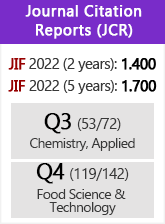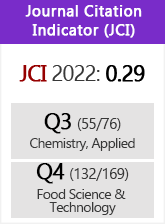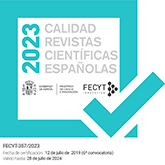Rheology of spray-dried egg-yolk products
DOI:
https://doi.org/10.3989/gya.2000.v51.i4.419Keywords:
Egg yolk, Rheology, Viscoelasticity, ViscosityAbstract
The emulsification process, as weIl as and the emulsion rheology and stability, greatly depends on the rheological properties of the continuous phase, the most important ingredient of which is yolk. However, since native yolk is not microbiologically stable, processing of yolk, such as spray-drying, is necessary for food applications. The influence of processing by spray-drying on the microstructure and rheological properties of yolk was investigated using oscillatory, creep and steady state flow measurements. The spray-drying process produces denaturation of proteins giving rise to a dramatic change from a fluid-like behaviour, as corresponds to the native yolk, to a gel-like behaviour corresponding to the reconstituted dried yolk (45% solids). Temperature exerts a slight influence on the linear viscoelastic properties of processed yolk.
Downloads
Download data is not yet available.
Downloads
Published
2000-08-30
How to Cite
1.
Miranda J, Guerrero AF, Partal P. Rheology of spray-dried egg-yolk products. Grasas aceites [Internet]. 2000Aug.30 [cited 2024Apr.19];51(4):244-50. Available from: https://grasasyaceites.revistas.csic.es/index.php/grasasyaceites/article/view/419
Issue
Section
Research
License
Copyright (c) 2000 Consejo Superior de Investigaciones Científicas (CSIC)

This work is licensed under a Creative Commons Attribution 4.0 International License.
© CSIC. Manuscripts published in both the printed and online versions of this Journal are the property of Consejo Superior de Investigaciones Científicas, and quoting this source is a requirement for any partial or full reproduction.All contents of this electronic edition, except where otherwise noted, are distributed under a “Creative Commons Attribution 4.0 International” (CC BY 4.0) License. You may read here the basic information and the legal text of the license. The indication of the CC BY 4.0 License must be expressly stated in this way when necessary.
Self-archiving in repositories, personal webpages or similar, of any version other than the published by the Editor, is not allowed.
















